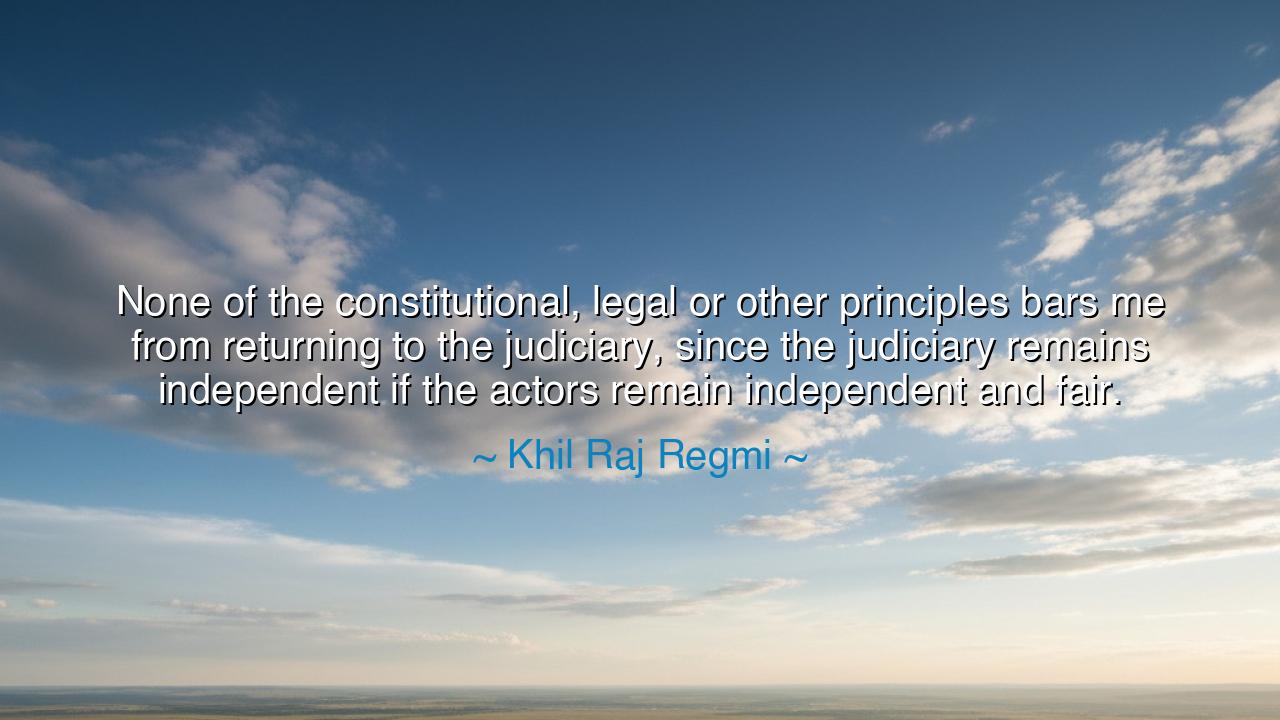
None of the constitutional, legal or other principles bars me
None of the constitutional, legal or other principles bars me from returning to the judiciary, since the judiciary remains independent if the actors remain independent and fair.






When Khil Raj Regmi declared, “None of the constitutional, legal or other principles bars me from returning to the judiciary, since the judiciary remains independent if the actors remain independent and fair,” he spoke not only as a jurist defending his integrity, but as a philosopher of governance. In these words lies a truth older than any constitution: that the soul of justice does not reside in documents, decrees, or titles — but in the character of those who serve it. Regmi reminds us that independence of the judiciary is not a condition granted by law, but a virtue earned by the courage and conscience of its actors.
Born in Nepal’s turbulent political era, Regmi stood at a crossroads where politics and justice collided. Having served both as Chief Justice and later as Head of the Interim Government, his decision to return to the judiciary drew controversy. Critics questioned whether such a return could preserve judicial integrity. But Regmi’s statement cut to the heart of the matter: the independence of institutions depends not on separation of offices alone, but on the independence of the spirit. A truly fair and just judiciary is sustained not by law’s letter but by the uprightness of those who interpret it.
In these words, one hears echoes of ancient wisdom — the same principle that guided philosophers and sages who believed that virtue, not position, determines justice. Long before modern courts, in the agora of Athens or the councils of ancient India, elders warned that no law can protect justice if the hearts of its guardians are corrupted. Regmi’s declaration is therefore not a defense of self-interest, but a reaffirmation of that eternal truth: the rule of law lives only where the rule of conscience prevails.
History has proven him right time and again. When Nelson Mandela emerged from prison and later became president, he could have turned the courts of South Africa into weapons of vengeance. Yet he did not. He appointed judges who were both fair and fearless, insisting that the judiciary remain independent even in the dawn of a new democracy. He understood, as Regmi did, that fairness is not maintained by constitutional clauses but by human integrity. It is the man or woman behind the bench — not the marble walls of the courtroom — who determines whether justice lives or dies.
Regmi’s words are a challenge to all who serve in public life. They ask: can you remain independent and fair even when power tempts you, when partisans whisper, when ambition clouds judgment? True independence is not isolation, but resistance — the inner strength to act rightly when the winds of politics blow fiercely against you. In this sense, Regmi’s statement is less about legality and more about moral courage — the power to hold one’s ground amid the shifting tides of history.
To the listener of today, these words carry a deep lesson: the health of a nation’s justice depends not on the perfection of its constitution but on the integrity of its citizens. A law, no matter how well written, is but ink and parchment if those entrusted to apply it are weak or self-serving. The actors — judges, lawyers, officials, and even the common people — must guard their fairness as one guards sacred fire. Without it, independence is illusion.
Therefore, let each generation take Regmi’s wisdom as a commandment: cultivate the independence of spirit, even when the world around you seeks to chain it. Whether you sit in a courtroom, lead a village, or teach a child, act with fairness that springs from inner strength, not external approval. The judiciary, the government, the entire order of society — all remain free only when the hearts within them are free. For in the end, it is not the constitution that sustains justice, but the living, breathing integrity of those who dare to be just.






AAdministratorAdministrator
Welcome, honored guests. Please leave a comment, we will respond soon